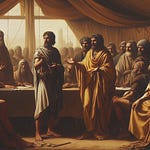What happens when someone you might perceive as inferior walks up and challenges how you are doing things? In Exodus 18 we learn that divine help and wisdom may come from unexpected sources.
Exodus 18 gives us a parenthetical detail regarding how Israel’s shared leadership arrangement was established, but it does so out of chronological order so that it does not interrupt the focus that is about to be placed on the giving of the law and God’s prescription for worship. Verse 16 assumes the law has already been given, while Numbers 10 and Deuteronomy 1 contain details that reveal the delegation of judicial responsibility occurred at Horeb, after the covenant was established.
Verses 1–6 set the scene. Jethro “heard of all that God had done for Moses” and came “unto Moses into the wilderness, where he encamped at the mount of God.” This is not casual interest. The verb “heard” in verse 1 carries weight—shema is not just reception but attention. The news of the plagues, the drama at the Red Sea, and the defeat of Amalek have echoed across the region. For reasons about which we can only speculate, Zipporah had been sent back to her father’s house. She now returns with her father and two sons, Gershom and Eliezer. Gershom means “a stranger there” and Eliezer means “my God is help.” Israel’s identity is enveloped in those names which suggest exile and deliverance. In verse 7 we’re told: “Moses went out to meet his father in law… and kissed him.” There’s no pride or aloofness, but love expressed through honor and hospitality.
In verses 8–12, Moses recounts “all that the Lord had done… and how the Lord delivered them.” Jethro’s response is not generic admiration but theological conversion: “Now I know that the Lord is greater than all gods.” The Hebrew construction is emphatic—this is not opinion but confession. Jethro is not merely impressed; he believes. He offers sacrifices, and Aaron and the elders join him to eat “before God.” This is the first shared covenant meal with a Gentile in the wilderness—an anticipation of what Isaiah 2 prophesies and Revelation 7 depicts.
In verses 13–27, the focus shifts. We’re told that Moses sits to judge “from morning until evening.” The leader is swamped leading to delays in the execution of justice. Jethro sees it and speaks plainly: “What thou doest is not good.” It’s the same phrase used in Genesis to mark things contrary to God’s original design, i.e. that it is not good that man be alone. A similar idea is seen here. For all of Moses’ devotion, his methodology was deficient. While Moses tries to explain his rationale—he is the mediator of God’s will, Jethro presses further: “Thou wilt surely wear away… this thing is too heavy.” Jethro’s counsel is simple: teach the people, appoint godly men, delegate lesser cases. Let Moses remain the intercessor and revelatory judge but empower others to share the burden of the work. The qualifications for these leaders are moral, relating to character—men who “fear God,” are “truthful,” and “hate covetousness.” In verses 24–26 we see Moses respond with humility. He obeyed. No resistance, no excuses. The man who once claimed he could not speak knows how to listen. The new system is implemented. Justice is distributed And Jethro returns home in peace.
Application
God converts sinners through the testimony of His works. Jethro didn’t come to faith through theological arguments. He heard the testimony of deliverance, judgment, provision, and the glory of God on behalf of His people. In addition, Moses didn’t whitewash the journey; he told “all the travail.” And in that honest account, Jethro saw the hand of God. Do you tell your story this way? It can be easy to sanitize the wilderness experience so others don’t detect the struggles. But it can be helpful to balance the trials with the experiences of divine intervention. Consider how the experience of the Messiah is told in Isaiah 53. God uses the telling of God’s grace in the midst of hardships and blessings to reveal truth to sinners.
Leadership must be shared to be sustained. Jethro’s words to Moses should pierce every pastor, parent, and leader: “This thing is too heavy for thee.” Moses was faithful but flawed. He bore the burden alone. And his good intentions became a bottleneck. The result? Weariness for himself and delays for everyone else. God’s work requires delegation of responsibility. Christ Himself trained others, sent others, and shared His mission. A one-man ministry is not a badge of honor—it is often a sign of pride or fear. Do you share the burden? Or are you slowly “wearing away”?
Christ is the greater Moses who never wears away. Jethro said to Moses, “This thing is too heavy for thee,” and he was right. No mere man can bear the judgment needs of an entire people. But Christ can. He does. He bore our griefs. He carried our sorrows. He was wounded for our transgressions. The task that wore Moses down is fulfilled in Jesus, who never grows weary in His mediatorial office. He is both the Judge and the Advocate, the one who reveals God’s law and bears God’s wrath. Moses delegated out of weakness. But Christ ever lives to intercede for millions of believers and carry the responsibility of His vast kingdom. Thank God the government is upon his shoulder, and that for you who trust His, His yoke is easy, and His burden is light. When you have a case that needs to be addressed, remember that He that keepeth Israel never slumbers nor sleeps. Take it to Him.
Character matters more than charisma in God’s servants. While leaders, especially those who are primary in their position, need to have a certain natural ability to gain the trust of others, there are many positions of secondary leadership where this is not as necessary. Jethro’s counsel focused not on skills but on character: fear of God, truthfulness, hatred of covetousness. These are not resume items. These are heart realities that are apparent to others. I have known young men who appear well-intentioned, but other people simply do not trust them and will never appoint them to positions of responsibility. Do you aspire to lead? Then examine your life. Leadership in the kingdom begins with integrity, not influence. A commitment to do the small things before gaining access to the greater.
Christ brings outsiders to the table with Himself. This covenant meal with Jethro—an outsider, a Midianite—is an indication of something far greater. In Christ, strangers become sons. Those once “afar off are made nigh by the blood of Christ.” He is not only the God of Israel but the desire of nations. Through Christ the veil is torn, the door is flung open wide, and every tribe and tongue is summoned to dine with Abraham, Isaac, and Jacob in the kingdom of God. Jesus said, “Many shall come from the east and west, and shall sit down with Abraham…” (Matt. 8:11). Youn person, will you be there on that day? Do you watch the Lord’s Table at your church and long to join in? Before you can take the bread and the cup, by faith you must reach out and take Christ. Turn from your sins and believe on Him today.
“Of all the requirements that could be thought of for men to administer justice in so mighty a nation as this nation had now become, set at the very pinnacle place of importa nce is that they must be men who fear God. Whatever other qualities they have or may not have, if they are not men whose primary characteristic is the fear of God, they are not qualified for this significant role of the administration of justice and the solving of problems within the nation of Israel.” — Charles Spurgeon










